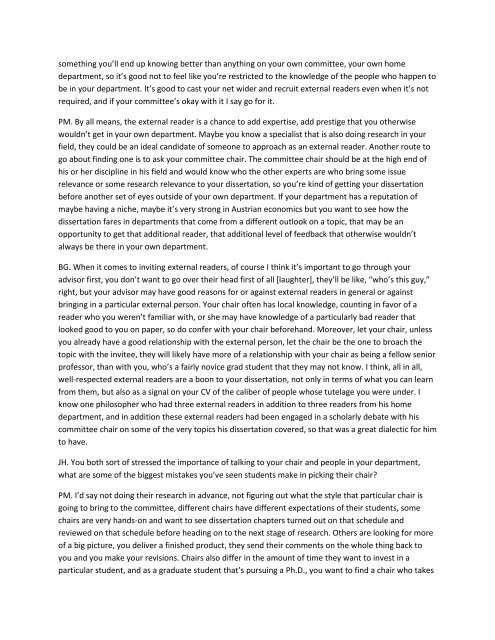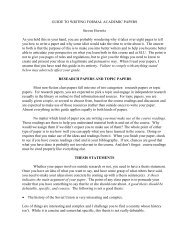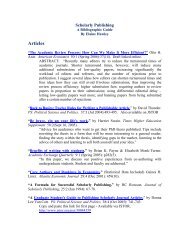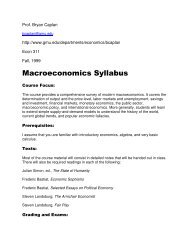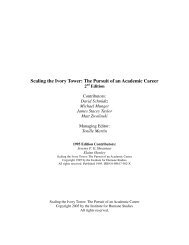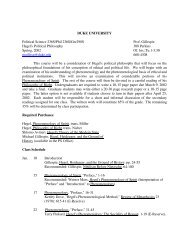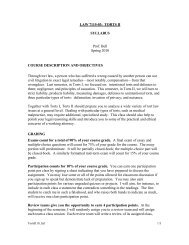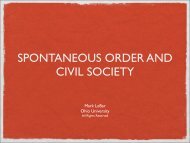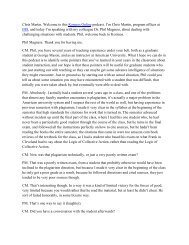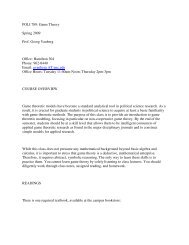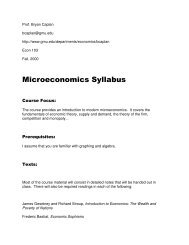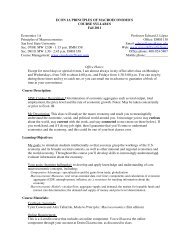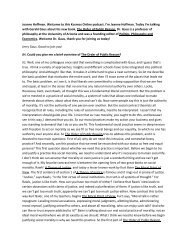Jeanne Hoffman. Welcome to this Kosmos Online podcast. I'm ...
Jeanne Hoffman. Welcome to this Kosmos Online podcast. I'm ...
Jeanne Hoffman. Welcome to this Kosmos Online podcast. I'm ...
You also want an ePaper? Increase the reach of your titles
YUMPU automatically turns print PDFs into web optimized ePapers that Google loves.
something you’ll end up knowing better than anything on your own committee, your own home<br />
department, so it’s good not <strong>to</strong> feel like you’re restricted <strong>to</strong> the knowledge of the people who happen <strong>to</strong><br />
be in your department. It’s good <strong>to</strong> cast your net wider and recruit external readers even when it’s not<br />
required, and if your committee’s okay with it I say go for it.<br />
PM. By all means, the external reader is a chance <strong>to</strong> add expertise, add prestige that you otherwise<br />
wouldn’t get in your own department. Maybe you know a specialist that is also doing research in your<br />
field, they could be an ideal candidate of someone <strong>to</strong> approach as an external reader. Another route <strong>to</strong><br />
go about finding one is <strong>to</strong> ask your committee chair. The committee chair should be at the high end of<br />
his or her discipline in his field and would know who the other experts are who bring some issue<br />
relevance or some research relevance <strong>to</strong> your dissertation, so you’re kind of getting your dissertation<br />
before another set of eyes outside of your own department. If your department has a reputation of<br />
maybe having a niche, maybe it’s very strong in Austrian economics but you want <strong>to</strong> see how the<br />
dissertation fares in departments that come from a different outlook on a <strong>to</strong>pic, that may be an<br />
opportunity <strong>to</strong> get that additional reader, that additional level of feedback that otherwise wouldn’t<br />
always be there in your own department.<br />
BG. When it comes <strong>to</strong> inviting external readers, of course I think it’s important <strong>to</strong> go through your<br />
advisor first, you don’t want <strong>to</strong> go over their head first of all [laughter], they’ll be like, “who’s <strong>this</strong> guy,”<br />
right, but your advisor may have good reasons for or against external readers in general or against<br />
bringing in a particular external person. Your chair often has local knowledge, counting in favor of a<br />
reader who you weren’t familiar with, or she may have knowledge of a particularly bad reader that<br />
looked good <strong>to</strong> you on paper, so do confer with your chair beforehand. Moreover, let your chair, unless<br />
you already have a good relationship with the external person, let the chair be the one <strong>to</strong> broach the<br />
<strong>to</strong>pic with the invitee, they will likely have more of a relationship with your chair as being a fellow senior<br />
professor, than with you, who’s a fairly novice grad student that they may not know. I think, all in all,<br />
well-respected external readers are a boon <strong>to</strong> your dissertation, not only in terms of what you can learn<br />
from them, but also as a signal on your CV of the caliber of people whose tutelage you were under. I<br />
know one philosopher who had three external readers in addition <strong>to</strong> three readers from his home<br />
department, and in addition these external readers had been engaged in a scholarly debate with his<br />
committee chair on some of the very <strong>to</strong>pics his dissertation covered, so that was a great dialectic for him<br />
<strong>to</strong> have.<br />
JH. You both sort of stressed the importance of talking <strong>to</strong> your chair and people in your department,<br />
what are some of the biggest mistakes you’ve seen students make in picking their chair?<br />
PM. I’d say not doing their research in advance, not figuring out what the style that particular chair is<br />
going <strong>to</strong> bring <strong>to</strong> the committee, different chairs have different expectations of their students, some<br />
chairs are very hands-on and want <strong>to</strong> see dissertation chapters turned out on that schedule and<br />
reviewed on that schedule before heading on <strong>to</strong> the next stage of research. Others are looking for more<br />
of a big picture, you deliver a finished product, they send their comments on the whole thing back <strong>to</strong><br />
you and you make your revisions. Chairs also differ in the amount of time they want <strong>to</strong> invest in a<br />
particular student, and as a graduate student that’s pursuing a Ph.D., you want <strong>to</strong> find a chair who takes


